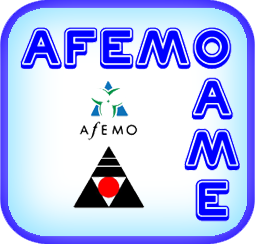

Grade 6 Resources
Overall Lesson Webinar Recording Webinar Support Lesson Support
Select All Clear All
A summary of Virtual Manipulatives for Fractions that are available, including links, and considerations for their usage.
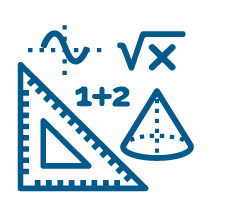 Ontario Mathematics Curriculum, 2020, Grades 1 - 8
[URL]
Ontario Mathematics Curriculum, 2020, Grades 1 - 8
[URL]
This curriculum policy replaces The Ontario Curriculum, Grades 1-8: Mathematics, 2005. Beginning in September 2020, all mathematics programs for Grades 1 to 8 will be based on the expectations outlined in this curriculum policy.
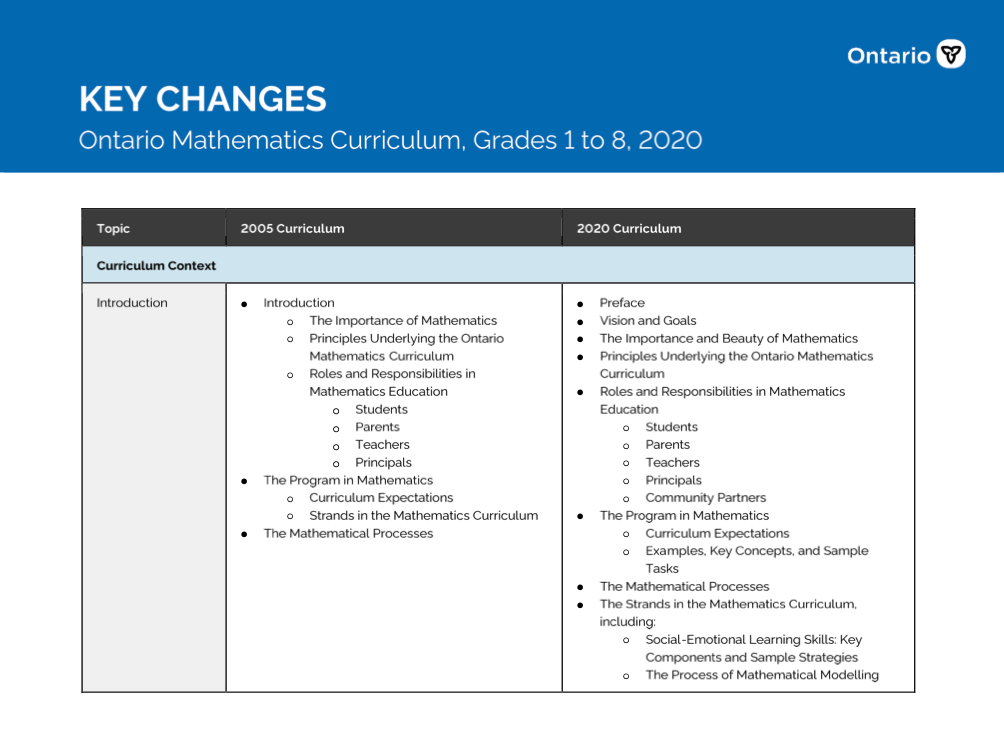 Key Changes - Ontario Mathematics Curriculum, Grades 1 to 8, 2020
[PDF]
Key Changes - Ontario Mathematics Curriculum, Grades 1 to 8, 2020
[PDF]
This document, prepared by the Ontario Ministry of Education, compares in table form the key changes between the 2005 and the 2020 elementary mathematics curriculum.
A continuum from Grades 1-8 outlining the key coding concepts per grade coupled with a Scratch project with teacher notes.
In this lesson, students will be learning to multiply and divide proper fractions by whole numbers by calculating the amount of fabric used during the creation of class banners.
Students will use visual and concrete models, including number lines, to further develop their reasoning about how fractions can be combined through addition.
In this lesson, students will use concrete manipulatives, online apps, and simulations to examine fraction relationships. The Active Learning component centres on situations about the manufacturing process of shoelace making. Further lesson consolidation includes visual art ideas for patterns and tessellations.
In this lesson, students examine the idea of making a school garden. We live in a vast and varied province. Students develop a model to predict the likelihood of success for a variety of garden plans. The model would be used by others, for example, a parent group, when deciding the winning student-designed garden. Additional activities include information to create a garden and the study of Sustainable Development Goals in Social Studies.
In this 2-part lesson, students will engage in the process of mathematical modelling to produce a model that helps consumers understand their electricity consumption habits and/or which pricing model--Time-of-use or Tiered--is best in meeting their needs.
In this lesson, students find themselves in a messy, real-world problem. A free little library has been donated to the school. “What books are needed to continue to make the little library successful?” Students will make their own choices, assumptions and decisions as they develop a rating system to predict the likelihood a donated book will be read. Suggestions to extend the activity beyond the process of mathematical modelling to what is required to manage a real little library in the school are part of the further consolidation and next steps.
In this lesson, students will be thinking about ways resources are distributed by means of donating, exchanging, lending, and borrowing through the creation of a community project.
In this lesson, students will be identifying types of financial goals and how to achieve them, as well as describing factors that help or interfere with reaching them. Students will then continue working towards the lesson learning goals using a project-based approach--preparing and presenting a convincing argument for how they will be able to reach their fundraising goal.
In this lesson, students will be learning to compare different methods of payment--identifying advantages and disadvantages--and the best ways to use them. Students will also analyze and identify how interest rates are applied to various methods of payment in order to make the best financial decision possible when making a purchase.
Creating a pseudocode for the actions to determine the actions used when using an "input/output machine" students then identify the Scratch coding blocks that will carry out these actions. They can remix a sample Scratch project or programme their own from a starter Scratch project. This lesson and Which is Greater? focus on developing your students' understanding of positive and negative integers. Note: For teachers not familiar with Scratch coding, instructions are included to assist your teaching of these lessons.
In an unplugged environment, students will be coding transformations--combinations of translations and reflections--on the Cartesian plane by writing and executing pseudocode.
In an unplugged environment, students will be learning to understand the movement of objects on the Cartesian plane through the graphing of ordered pairs (x, y) and using combinations of translations and reflections to transform objects. This lesson can be used in advance of Lesson 1, "Coding Transformations - Unplugged!"
In this lesson, students will code using Google Sheets or any spreadsheet program. Students will be creating a budget to help plan for a financial goal while considering earnings and expenses.
Creating a pseudocode for the actions to determine which integer is greater than another, students then identify the Scratch coding blocks that will carry out these actions. They can remix a sample Scratch project or programme their own from a starter Scratch project. The use of a number line in the coding projects gives a visual representation to the integers. Note: For teachers not familiar with Scratch coding, instructions are included to assist your teaching of these lessons.
Through the use of pseudocode, students will be learning to decompose their mathematical thinking regarding the concepts of prime and composite numbers and algorithms; identify the factors of composite numbers as a series of actions; connect those actions to block coding, and in doing so, reinforce their computational thinking. Note: Consider using coding lesson after the students understand the concept of factoring. For teachers not familiar with Scratch coding, instructions are included to assist your teaching of these lessons.
Welcome to this webinar about teaching the new Mathematical Modelling expectations for the junior grades of the revised mathematics curriculum. In this webinar, we take you through the lessons that have been created by Ontario educators to support Ontario educators. These Mathematical Modelling lessons have a focus on developing students’ appreciation for the role mathematics plays in real “real life” while providing students with opportunities to experience mathematics in a more personal and relevant way.
Welcome to this webinar about teaching the Number expectations for the junior grades of the revised mathematics curriculum. In this webinar, we take you through the lessons that have been created by Ontario educators to support Ontario educators. These Number lessons have a focus on developing fraction concepts and skills. These lessons benefit from the latest research about learning fractions, including an emphasis on high-yield visual representations.
Welcome to this webinar about teaching the new Financial Literacy expectations for the junior grades of the revised mathematics curriculum. In this webinar, we take you through the lessons that have been created by Ontario educators to support Ontario educators. In developing the Financial Literacy lessons for this project, the intentional decision to use scenarios was made. Scenarios give the opportunity to have a discussion about financial choices and the inequities of access to those choices. The goal was to provide students with a chance to learn and understand the individual skills needed that impact personal financial choices and also the economic literacy needed to understand the impact of financial systems as a whole.
Welcome to this webinar about coding in the mathematics curriculum. We will be taking you through the pedagogy and social emotional learning skills that coding brings to your classroom as well as the lessons that have been created as supports for Ontario teachers in the Junior grades.
NOTE: This recording does not yet contain the Q&A section - those will be added soon from all the recordings with captioning.
A bilingual compilation of pertinent vocabulary directly related to computational thinking and computer programming/coding.
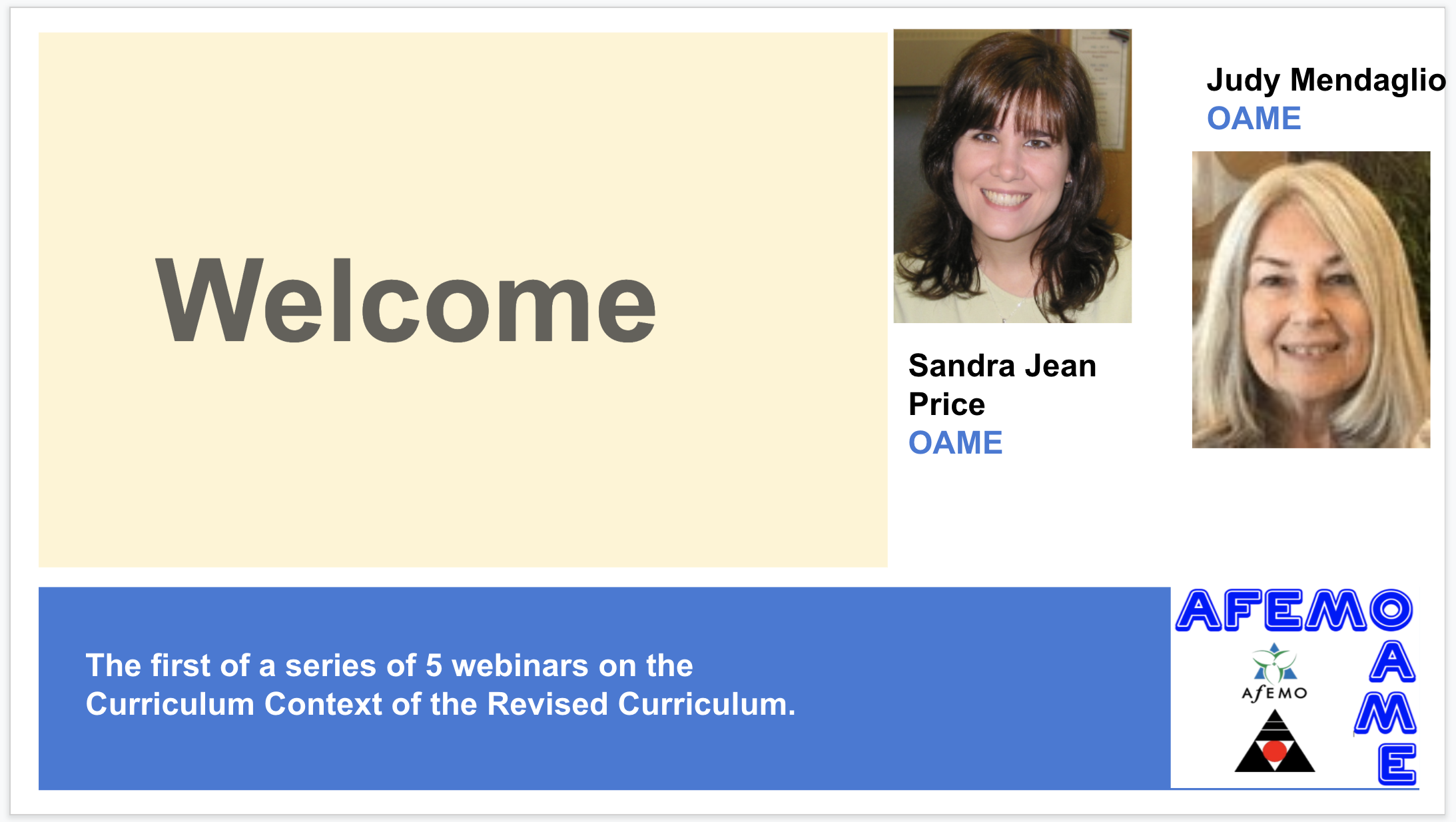 Webinar 1 - Vision, Goals, and Strands
[MP4]
Webinar 1 - Vision, Goals, and Strands
[MP4]
This hour-long webinar will outline the vision, goals and strands of the revised Ontario Elementary Mathematics Curriculum. In this webinar, we will unpack these very important sections of the Curriculum Context of the revised curriculum, providing educators with an introduction as to how this "front matter" has expanded and what these changes mean to educators as they plan their math programs. We will also give an overview of the changes in the curriculum, particularly as they relate to the strands.
Also available:
* the slides for this presentation, in Google Slides format.
* links and resources document, "Resources for Curriculum Context Webinar 1" , comprising links to research, videos, audio, and websites which may be of use to you as you continue to explore the Vision, Goals, and Strands in the Revised Elementary Math Curriculum (2020). [Google Doc]
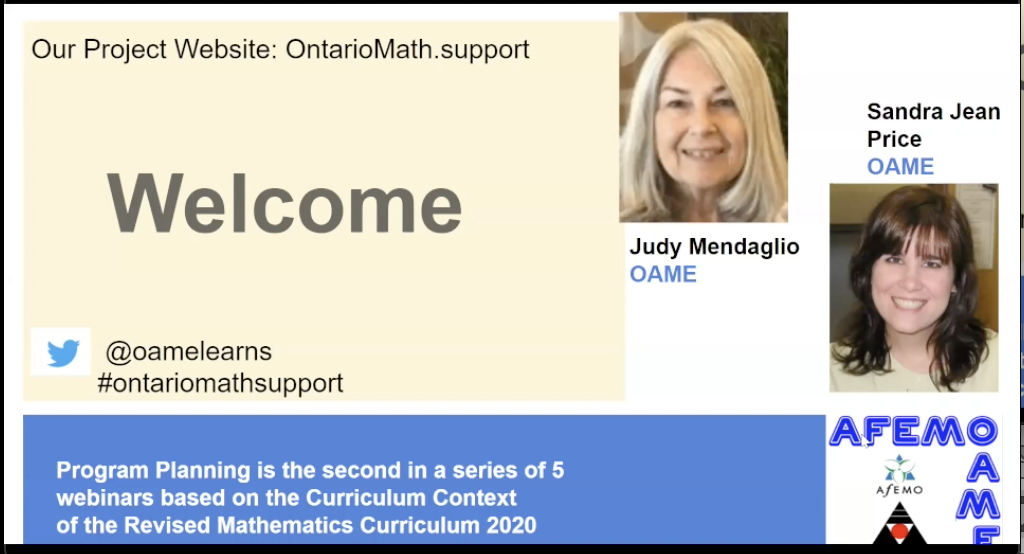 Webinar 2 - Program Planning
[MP4]
Webinar 2 - Program Planning
[MP4]
This hour-long webinar will focus on program planning for the revised Elementary Mathematics Curriculum. In this webinar, we will explore the contents of the Program Planning section of the “Curriculum Context”, and provide educators with an introduction to what these changes mean to educators as they plan their math programs.
Also available:
* the slides for this presentation, in Google Slides format.
* links and resources document, "Resources for Curriculum Context Webinar 2" , comprising links to research, videos, audio, and websites which may be of use to you as you continue to learn more about the considerations for program planning found in the Revised Elementary Math Curriculum (2020). [Google Doc]
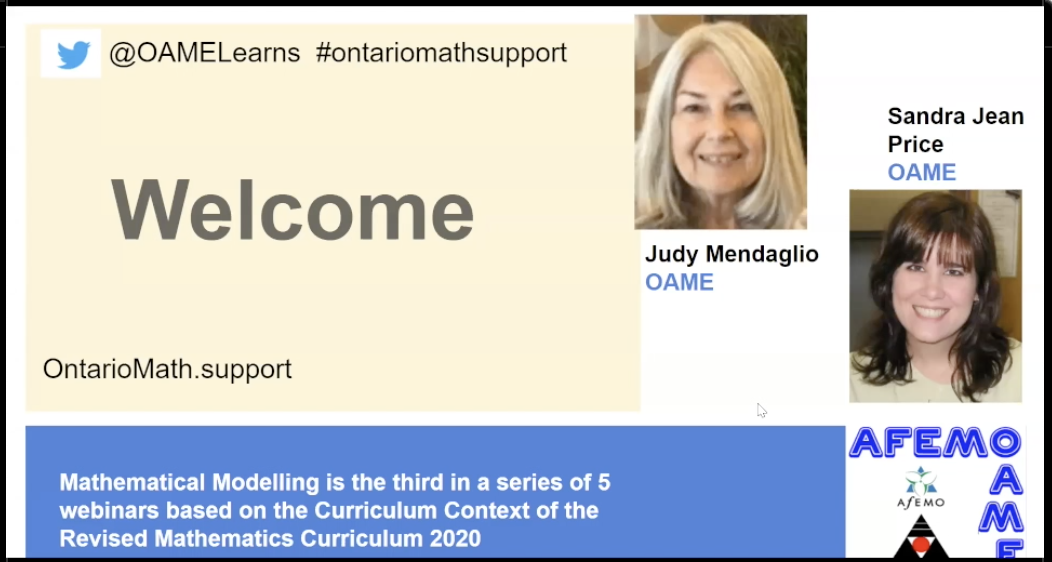 Webinar 3 - Mathematical Modelling
[MP4]
Webinar 3 - Mathematical Modelling
[MP4]
This hour-long webinar will focus on Mathematical Modelling. In this webinar, we will explore in detail what the mathematical modelling process looks like and how it is truly new to the curriculum. We hope to deepen educators’ understanding of what Mathematical Modelling is and how it can be woven into a math program. Sample tasks will be discussed.
Also available:
* the slides for this presentation, in Google Slides format.
* links and resources document, "Resources for Curriculum Context Webinar 3", comprising links to research, videos, audio, and websites which may be of use to you as you continue to learn more about the Mathematical Modelling process.
 Webinar 4 - Social-Emotional Learning (SEL) Skills in Mathematics and the Mathematical Processes
[MP4]
Webinar 4 - Social-Emotional Learning (SEL) Skills in Mathematics and the Mathematical Processes
[MP4]
This hour-long webinar focuses on Social-Emotional Learning Skills in Mathematics & the Mathematical Processes. Examine this strand in more detail, and look at connecting SEL Skills, Mathematical Processes, and assessment and instruction of the remaining five strands.
Also available:
* link and resources document, "Resources for Curriculum Context Webinar 4: Strand A - Social-Emotional Learning Skills in Mathematics and the Mathematical Processes", you will find links to research, videos, audio, and websites which may be of use to you as you continue to learn more about SES and the Mathematical Processes.
 Webinar 5 - Assessment and Evaluation
[MP4]
Webinar 5 - Assessment and Evaluation
[MP4]
This hour-long webinar focuses on Assessment and Evaluation. Revisit assessment and evaluation of student learning in light of the revised elementary math curriculum and its expanded Curriculum Context.
Also available:
* link and resources document, "Resources for Curriculum Context Webinar 5: Assessment and Evaluation", you will find links to research, videos, audio, and websites which may be of use to you as you continue to learn more about this topic.
Welcome to this webinar about coding in the mathematics curriculum. We will be taking you through the pedagogy and social emotional learning skills that coding brings to your classroom as well as the lessons that have been created as supports for Ontario teachers in the Junior grades.
NOTE: This recording does not yet contain the Q&A section - those will be added soon from all the recordings with captioning.
Welcome to this webinar about teaching the new coding expectations for the intermediate grades of the revised mathematics curriculum. We will be taking you through the lessons that have been created as supports for Ontario educators as well as the pedagogy and social emotional learning skills that coding brings to your classroom.
NOTE: This recording does not yet contain the Q&A section - those will be added soon from all the recordings with captioning.
Welcome to this webinar about coding in the mathematics curriculum. We will be taking you through the pedagogy and social emotional learning skills that coding brings to your classroom as well as the lessons that have been created as supports for Ontario teachers in the primary grades.
NOTE: This recording does not yet contain the Q&A section - those will be added soon from all the recordings with captioning.
Welcome to this webinar about teaching the new Financial Literacy expectations for the primary grades of the revised mathematics curriculum. In this webinar, we take you through the lessons that have been created by Ontario educators to support Ontario educators. In developing the Financial Literacy lessons for this project, the intentional decision to use scenarios-based tasks was made. The goal of the lessons were to provide real-life contexts for students to develop their understanding of money concepts, as an individual and a community.
Welcome to this webinar about teaching the Number expectations for the primary grades of the revised mathematics curriculum. In this webinar, we take you through the lessons that have been created by Ontario educators to support Ontario educators. These Number lessons have a focus on developing fraction concepts and skills. These lessons benefit from the latest research about learning fractions, including an emphasis on high-yield visual representations.
Welcome to this webinar about teaching the new Mathematical Modelling expectations for the primary grades of the revised mathematics curriculum. In this webinar, we take you through the lessons that have been created by Ontario educators to support Ontario educators. These Mathematical Modelling lessons have a focus on developing students’ appreciation for the role mathematics plays in real “real life” while providing students with opportunities to experience mathematics in a more personal and relevant way.
Welcome to this webinar about teaching the new Financial Literacy expectations for the junior grades of the revised mathematics curriculum. In this webinar, we take you through the lessons that have been created by Ontario educators to support Ontario educators. In developing the Financial Literacy lessons for this project, the intentional decision to use scenarios was made. Scenarios give the opportunity to have a discussion about financial choices and the inequities of access to those choices. The goal was to provide students with a chance to learn and understand the individual skills needed that impact personal financial choices and also the economic literacy needed to understand the impact of financial systems as a whole.
Welcome to this webinar about teaching the Number expectations for the junior grades of the revised mathematics curriculum. In this webinar, we take you through the lessons that have been created by Ontario educators to support Ontario educators. These Number lessons have a focus on developing fraction concepts and skills. These lessons benefit from the latest research about learning fractions, including an emphasis on high-yield visual representations.
Welcome to this webinar about teaching the new Mathematical Modelling expectations for the junior grades of the revised mathematics curriculum. In this webinar, we take you through the lessons that have been created by Ontario educators to support Ontario educators. These Mathematical Modelling lessons have a focus on developing students’ appreciation for the role mathematics plays in real “real life” while providing students with opportunities to experience mathematics in a more personal and relevant way.
Welcome to this webinar about teaching the new Financial Literacy expectations for the intermediate grades of the revised mathematics curriculum. In this webinar, we take you through the lessons that have been created by Ontario educators to support Ontario educators. In developing the Financial Literacy lessons for this project, the intentional decision to use scenarios was made. Scenarios give the opportunity to have a discussion about financial choices and the inequities of access to those choices. The goal was to provide students with a chance to learn and understand the individual skills needed that impact personal financial choices and also the economic literacy needed to understand the impact of financial systems as a whole.
Welcome to this webinar about teaching the Number expectations for the intermediate grades of the revised mathematics curriculum. In this webinar, we take you through the lessons that have been created by Ontario educators to support Ontario educators. These Number lessons have a focus on developing fraction concepts and skills. These lessons benefit from the latest research about learning fractions, including an emphasis on high-yield visual representations.
Welcome to this webinar about teaching the new Mathematical Modelling expectations for the intermediate grades of the revised mathematics curriculum. In this webinar, we take you through the lessons that have been created by Ontario educators to support Ontario educators. These Mathematical Modelling lessons have a focus on developing students’ appreciation for the role mathematics plays in real “real life” while providing students with opportunities to experience mathematics in a more personal and relevant way.
This webinar will introduce Ontario educators to three (3) course plans, each of which outlines a different way a teacher could structure the 2021 Grade 9 math course. These course plans have been shared on our OntarioMath.support website. Each course plan includes all of the curriculum expectations, providing suggestions as to how to group expectations to present mathematics in Grade 9 as a connected whole. In addition to providing ways to structure the course, each plan offers ideas for questions and tasks that will engage students with the mathematics they are learning. In this webinar, we will also outline the underlying principles upon which all three course plans have been designed to provide support for teachers as they implement a de-streamed grade 9 curriculum.
Also available: In "Resources related to Course Planning Webinar", you will find links to research, videos, audio, and websites which may be of use to you as you continue to learn more about Course Planning and the Revised Math Curriculum (2021).
This document is a Google Doc, in View Only mode. If desired, you can use File -> Download, or File -> Make a copy, to save a version for yourself.
August 2021
In this webinar about the transition from the revised elementary mathematics curriculum (2020) to the newly revised Grade 9 mathematics curriculum (2021), participants will receive specific information about the alignment of expectations for grades 7, 8, and 9. They will also receive guidance on approaches to course planning as well as lesson and assessment planning. References and resources available to support teachers will be shared. A Question and Answer period will be included in this webinar.
Also available: In "Resources for Secondary Transitions Webinar", you will find links to research, videos, audio, and websites which may be of use to you as you continue to learn more about the Revised Math Curriculum (2021).
This document is a Google Doc, in View Only mode. If desired, you can use File -> Download, or File -> Make a copy, to save a version for yourself.
How are de-streamed classrooms different? How must instruction and assessment be shifted to accommodate these differences? In this webinar, we will talk about the goal of ensuring success for ALL our students, as well as considerations and ideas that will support teachers as they plan their math programs.
Also available: In "Resources related to De-Streaming for Success Webinar", you will find links to research, videos, audio, and websites which may be of use to you as you continue to learn more about De-streaming and the Revised Math Curriculum (2021).
This document is a Google Doc, in View Only mode. If desired, you can use File -> Download, or File -> Make a copy, to save a version for yourself.
Creating a safe and inclusive learning environment, one that encourages student collaboration and student choice, is critical to successfully implementing the 2021 de-streamed mathematics program. In this webinar, we will share practical strategies for meeting the challenges of teaching this new curriculum while ensuring equity and inclusivity, bringing student voice and student lived experiences into the mathematics learning.
Also available: In "Resources related to Shaping the Learning Environment Webinar", you will find links to research, videos, audio, and websites which may be of use to you as you continue to learn more about the Revised Math Curriculum (2021).
This document is a Google Doc, in View Only mode. If desired, you can use File -> Download, or File -> Make a copy, to save a version for yourself.
“In Grade 9, students transition to using coding as a tool to interact with the mathematics they are learning. They use the skills developed in elementary to create and alter code in a multitude of coding environments including text-based programming languages, spreadsheets, computer algebra systems (CAS), and virtual graphing and geometry tools.” (2021 MTH1W)
What do students know about coding coming into Grade 9? How am I supposed to teach coding as well as all the other math expectations? How can I support students when I don’t know how to code? If you’ve asked yourself some of these questions, come to this webinar to explore some answers.
Also available: In "Resources: Strand A - Mathematical Thinking and Making Connections through Coding", you will find links to research, videos, audio, and websites which may be of use to you as you continue to learn more about the Revised Math Curriculum (2021).
This document is a Google Doc, in View Only mode. If desired, you can use File -> Download, or File -> Make a copy, to save a version for yourself.
This hour-long webinar will focus on how the process of Mathematical Modelling, integrated with Grade 9 math concepts, can effectively support student development of strong mathematical thinking skills. In this webinar, we will explore in detail what the mathematical modelling process looks like and how it naturally builds connections between math and other disciplines, as well as between math and students' own cultures and communities. We hope to deepen educators’ understanding of what Mathematical Modelling is and how it can be woven into a math program. Sample tasks will be discussed.
Also available: In "Resources: Strand A - Mathematical Thinking and Making Connections through Mathematical Modelling", you will find links to research, videos, audio, and websites which may be of use to you as you continue to learn more about the Revised Math Curriculum (2021).
This document is a Google Doc, in View Only mode. If desired, you can use File -> Download, or File -> Make a copy, to save a version for yourself.
Students in Ontario are navigating a complex world driven by data. Our world is evolving and new fields and careers are emerging that require individuals with high levels of data literacy. Supporting students as they develop critical data literacy skills is an essential component of the new de-streamed Grade 9 curriculum. Data literacy is different from data management. Certainly, data management skills are important to analyse data. As part of the revised elementary mathematics curriculum in 2020, students have been building their data management skills. How do we connect these with the larger goal of achieving data literacy? What are the competencies necessary for data literacy, and how will we continue to build these competencies to ensure that all students leave our schools as data literate young adults? In this webinar, we will talk more about these competencies, and we will share strategies for integrating data literacy into the teaching of each of the math strands.
Also available: In "Resources: Data Literacy Across the Strands", you will find links to research, videos, audio, and websites which may be of use to you as you continue to learn more about the Revised Math Curriculum (2021).
This document is a Google Doc, in View Only mode. If desired, you can use File -> Download, or File -> Make a copy, to save a version for yourself.


